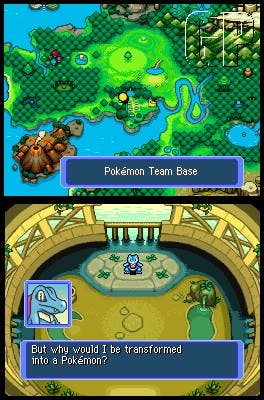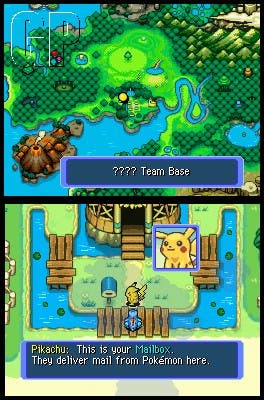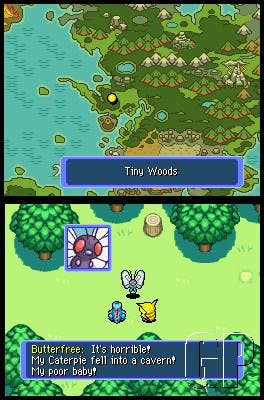Pokémon Mystery Dungeon: Blue Rescue Team
Gotta rescue 'em all. By exploring dungeons.
Okay, so I have to declare an interest. My favourite game in the entire world, ever, ever, is a game called Rogue. It's a game created in 1980, in which you play the part of an adventurer who is represented by an @ sign. This adventurer explores randomly generated dungeons made out of ASCII characters and fights monsters represented by letters, and the game itself spawned a whole genre of 'roguelike' games - more complicated imitators that are enormously popular on the internet, where they can generally be downloaded for free.
Why does that matter? Because the latest Pokémon title is sort of the same game, except with pretty pictures in place of ASCII characters, and cute little Pokémon instead of letters and @ signs. It's the latest in developer Chunsoft's Mystery Dungeon series of roguelike games, most of which feature characters licensed from other videogames such as Dragon Quest and Final Fantasy, and most of which have only really been very popular in Japan. Now that the series has been allied to Nintendo's cash cow kiddie phenomenon on the Nintendo DS and GBA, it's set to hit the big time over here too.
The first departure from the RPG formula that characterises the core Pokémon titles comes right at the start of the game: instead of taking on the role of a trainer, the player is transformed into one of 16 Pokémon, on the basis of a personality quiz. Answering truthfully, because reviewers never lie, your humble correspondent ended up as Machop because of my braveness and a strong sense of right or wrong (perfect qualities for a videogame critic, I think you'll agree - but I digress). Once transformed into a Pokémon you'll choose another Pokémon as your first companion and from there you're on your way to forming a Rescue Team.

Then you'll start exploring randomly generated dungeons and fighting other Pokémon in order to discover why you've turned into a Pokémon, and why all the other Pokémon are going crazy and fighting each other. Every morning the mailbox outside your Team Base will contain several new help requests from other Pokémon who have got lost or dropped something in a dungeon, and assisting them will increase your Rescue Team's reputation. In addition to these essentially side-quests, there are also story quests, introduced with proper little dialogue sequences, and completing these is what drives the game's narrative - a 15-hour quest to save the world and beat the Team Meanies.
Either way, every quest in the game will see you descend through the depths of a randomly generated dungeon to rescue, fight, or trade with a particular Pokémon (or ascend the heights in some cases). While you're down (or up) there you'll need to make sure you eat enough to stave off hunger, you'll need to manage your inventory and skills, and you'll sometimes need to deal with special weather conditions. And you'll have to defend your CPU-controlled team-mates from other Pokémon, because if anyone runs out of hit points you'll be sent back to town with some of your items or money missing.
In tried and tested roguelike style, each move you make is one clock cycle; so, for every action you take, the other Pokémon take one too. This means that although it looks like an action RPG, it's actually turn-based. The combat is also roguelike, requiring you to simply face your target and hit the attack button. It's made more sophisticated by the ability to use familiar Pokémon Moves like (in Machop's case) Low Kick and Karate Chop; and also the ability to throw and use items as weapons.

When you're not on quests you can visit Pokémon Square to gather provisions for your next dungeon excursion, or to store inventory and money so you don't lose it if anything goes wrong. There are also a couple of other interesting services: first, the ability to 'link' your Moves to create a single combo attack that only takes a single turn; and second, you can buy 'Friend Areas'. Y'see, you don't capture Pokémon in Pokéballs any more. Nope. Now you simply buy a place for them to live and wait for them to be sufficiently impressed with your rescue skills to join your Rescue Team.
And that's probably going to be the rub with Pokéfans (ie. most people). Because while there's a lot more to Mystery Dungeon than initially meets the eye, and it's certainly a lot more sophisticated than its kiddie veneer would suggest, it doesn't quite match the masterstrokes of design that made the original games so great. The series-defining gotta catch 'em all dynamic doesn't work quite as well in Mystery Dungeon, and its randomly generated realms don't convey quite the same structured sense of exploration and discovery. Other elements that aren't quite up to scratch include evolution, which only really puts in an appearance after you've completed the main quest, and the paper-scissors-stone-style hierarchy of Pokémon, which isn't as super effective as before.
Other criticisms could, if you were feeling ungenerous, include the DS functionality (there isn't really any: the touch-screen isn't necessary, and the second screen just shows maps and status reports that you can also access on the main screen); and the link-up facility, which basically boils down to the ability to rescue other players if they get stuck in a dungeon.

But for Rogue fans (i.e. me), Mystery Dungeon has hidden depths that make up for these drawbacks. As the game progresses, Dungeons become more interesting places - and dangerous ones, filled with lava and traps and the like. And levelling up your team-mates, managing your inventory, and clearing out dungeons becomes addictive pretty quickly - even though the side-quest structure allows you to play the game as slowly as you like.
So the game's certainly not the same one that Pokémon fans have grown accustomed to playing every time it comes out. And in some respects it's not as satisfying. But in other respects it's more satisfying. So it's sort of different satisfying, depending on what you like. Ironically, it's a game that'll probably be criticised for not being the same game as before. But actually that's one of its strengths. Especially if, like me, you're a massive fan of Rogue.







